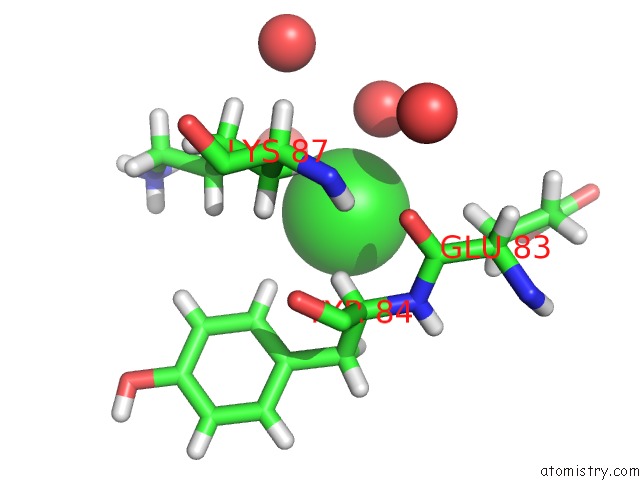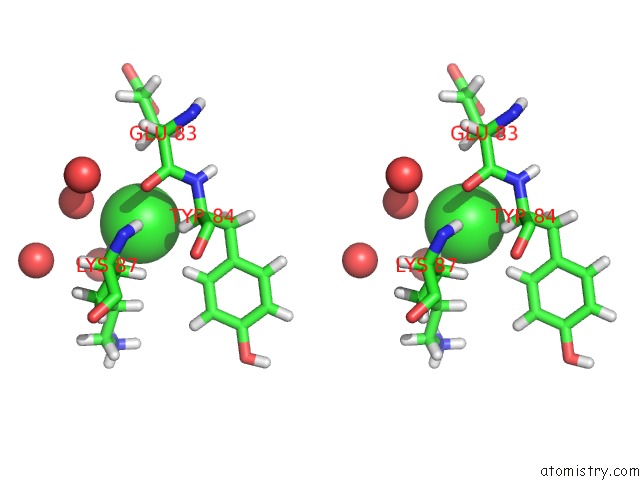Chlorine »
PDB 6xro-6xz8 »
6xy5 »
Chlorine in PDB 6xy5: Ternary Complex of 14-3-3 Sigma (C38N), Estrogen Related Receptor Gamma (Dbd) Phosphopeptide, and Disulfide Ppi Stabilizer 5
Protein crystallography data
The structure of Ternary Complex of 14-3-3 Sigma (C38N), Estrogen Related Receptor Gamma (Dbd) Phosphopeptide, and Disulfide Ppi Stabilizer 5, PDB code: 6xy5
was solved by
B.A.Somsen,
C.Ottmann,
with X-Ray Crystallography technique. A brief refinement statistics is given in the table below:
| Resolution Low / High (Å) | 56.05 / 1.30 |
| Space group | C 2 2 21 |
| Cell size a, b, c (Å), α, β, γ (°) | 82.302, 112.109, 62.571, 90.00, 90.00, 90.00 |
| R / Rfree (%) | 16.2 / 17.8 |
Other elements in 6xy5:
The structure of Ternary Complex of 14-3-3 Sigma (C38N), Estrogen Related Receptor Gamma (Dbd) Phosphopeptide, and Disulfide Ppi Stabilizer 5 also contains other interesting chemical elements:
| Magnesium | (Mg) | 2 atoms |
| Bromine | (Br) | 1 atom |
Chlorine Binding Sites:
The binding sites of Chlorine atom in the Ternary Complex of 14-3-3 Sigma (C38N), Estrogen Related Receptor Gamma (Dbd) Phosphopeptide, and Disulfide Ppi Stabilizer 5
(pdb code 6xy5). This binding sites where shown within
5.0 Angstroms radius around Chlorine atom.
In total only one binding site of Chlorine was determined in the Ternary Complex of 14-3-3 Sigma (C38N), Estrogen Related Receptor Gamma (Dbd) Phosphopeptide, and Disulfide Ppi Stabilizer 5, PDB code: 6xy5:
In total only one binding site of Chlorine was determined in the Ternary Complex of 14-3-3 Sigma (C38N), Estrogen Related Receptor Gamma (Dbd) Phosphopeptide, and Disulfide Ppi Stabilizer 5, PDB code: 6xy5:
Chlorine binding site 1 out of 1 in 6xy5
Go back to
Chlorine binding site 1 out
of 1 in the Ternary Complex of 14-3-3 Sigma (C38N), Estrogen Related Receptor Gamma (Dbd) Phosphopeptide, and Disulfide Ppi Stabilizer 5

Mono view

Stereo pair view

Mono view

Stereo pair view
A full contact list of Chlorine with other atoms in the Cl binding
site number 1 of Ternary Complex of 14-3-3 Sigma (C38N), Estrogen Related Receptor Gamma (Dbd) Phosphopeptide, and Disulfide Ppi Stabilizer 5 within 5.0Å range:
|
Reference:
E.Sijbesma,
B.A.Somsen,
G.P.Miley,
I.A.Leijten-Van De Gevel,
L.Brunsveld,
M.R.Arkin,
C.Ottmann.
Fluorescence Anisotropy-Based Tethering For Discovery of Protein-Protein Interaction Stabilizers. Acs Chem.Biol. 2020.
ISSN: ESSN 1554-8937
PubMed: 33196173
DOI: 10.1021/ACSCHEMBIO.0C00646
Page generated: Sat Jul 12 21:50:24 2025
ISSN: ESSN 1554-8937
PubMed: 33196173
DOI: 10.1021/ACSCHEMBIO.0C00646
Last articles
Na in 1YGGNa in 1YE8
Na in 1YF1
Na in 1YAQ
Na in 1Y9Z
Na in 1YAO
Na in 1YAP
Na in 1Y9D
Na in 1YAN
Na in 1YAM